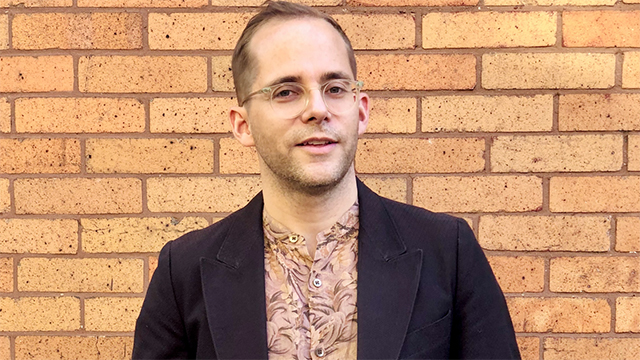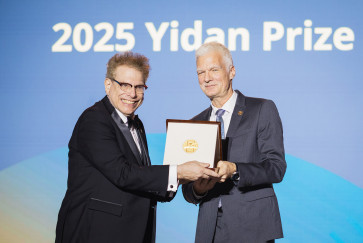Corey Byrnes, associate professor of modern and contemporary Chinese culture, comparative literary studies, and environmental humanities in the Weinberg College of Arts and Sciences, was selected as a 2021-2022 Radcliffe Institute Fellow, joining a class whose work spans the sciences, social sciences, humanities and arts.
Based at the Radcliffe Institute for Advanced Study at Harvard University, the Radcliffe Institute Fellowship Program annually supports the work of 50 leading artists and scholars and has rapidly become one of the most competitive programs of its kind in the world. The acceptance rate for the class, which represents nine countries, was 2.4%, from 1,383 applications.
“The 2021-2022 fellowship cohort is characterized by intellectual reach, excellence in scholarship and creativity,” said Radcliffe Dean Tomiko Brown-Nagin RI ’17, who is also the Daniel P. S. Paul Professor of Constitutional Law at Harvard Law School and a professor of history in the Harvard Faculty of Arts and Sciences. “Many of them are also focused on the most urgent problems of the day.
“In the wake of an unprecedented — and profoundly difficult — 14 months, the challenges facing our society are daunting. Some of these challenges are new, others are merely new to the spotlight — deep and longstanding issues that have been exacerbated by the pandemic and its far-reaching consequences. Our newest class of fellows will reckon with this moment and its meaning, and they will push the limits of knowledge and practice across the sciences, social sciences, arts and humanities. We cannot wait to welcome them.”
Corey Byrnes
Byrnes is an associate professor of modern and contemporary Chinese culture, comparative literary studies, and environmental humanities. He is the co-founder and co-director of Northwestern’s Kaplan Institute for the Humanities’ Environmental Humanities Workshop, which is the center of a lively and growing community of faculty and graduate students whose work engages with environmental issues.
Byrnes’ project, “China as Threat,” examines the relationship between China and a global environmental imaginary in which it is increasingly treated as an existential threat.
“Threat is an especially useful category for writing about a ‘rising’ China, which is often imagined as both a site of localized ecological ruination that prefigures imminent global collapse and also as a source of pollution and contagion that exceed national boundaries,” Byrnes said. “Particularly in the global north, China has become a focal point for ambient eco-anxieties that are inevitably shadowed by longer histories of perceived racial, cultural and economic threat. It’s easy (and essential) to critique the demonization of China; the challenge lies in disentangling imagined threats from very real and present environmental dangers. ‘China as Threat’ confronts this challenge by looking at the material and figural roles of threatened and threatening non-human animals in shaping China’s place in the global environmental imaginary.”
Byrnes said he couldn’t be more excited about being a Radcliffe Fellow next year.
“Not only will I gain much needed time and resources to do my research, I’ll be part of a remarkably interdisciplinary group of scholars and artists. This kind of community is hard to come by, and I know it will make my work better,” Byrnes said. “Even more importantly, after the upheaval and isolation of the last year or so, I feel humbled by the opportunity to join others in thinking through some of the most urgent questions of the moment.”


